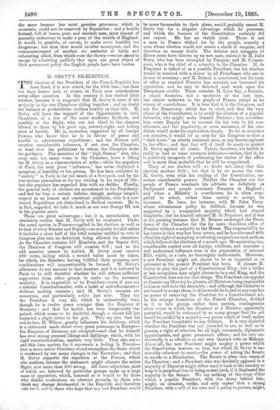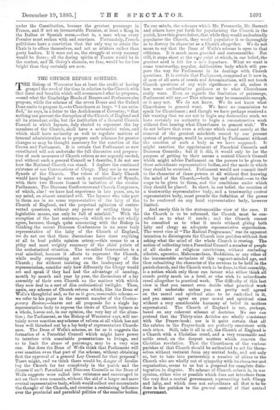M. GREVY'S RE-ELECTION.
THE election of the President of the French Republic has been fixed, it is now stated, for the 28th inst., less than ten days hence, and, of course, in Paris now overshadows every other question. In this country it has excited little interest; because it is supposed that M. Grevy is sure of his majority in the two Chambers sitting together ; and no doubt the balance of probabilities inclines heavily on that side. M. Gravy will have the support of the Opportunists in both Chambers, of a few of the more moderate Radicals, and possibly of the Right, who are not blind to the chances offered to them by his great age, seventy-eight, and failing state of health. He is, moreover, supported by all foreign Powers, who know that he is in favour of peace and hostile to adventurous expeditions ; and the Powers still exercise considerable influence, if not over the Chamber, at least over the politicians to whom the Chamber looks for guidance. The members of the " high finance " also, who sway only too many votes in the Chamber, have a liking for M. Grevy as a representative of order ; while the populace of Paris, the next great " influence," has never displayed a symptom of hostility to his person. He has been criticised by " society " in Paris as far too much of a bourgeois, and by the less serious journalists as far too retiring in his ways of life ; but the populace has regarded him with no dislike. Finally, the general body of electors are accustomed to his Presidency, and feel for him a certain definite, though perhaps languid, respect as an honest and consistent politician, who is a con- vinced Republican yet disinclined to Radical excesses. He is, in fact, regarded, we take it, much as our own George III. was in his popular years. These are great advantages ; but it is, nevertheless, not absolutely certain that M. Grevy will be re-elected. Under the usual system in France—applied to his election, as well as to that of every Senator and Deputy—no majority is valid unless it includes a clear half of the total number entitled to vote in Congress plus one, no deduction being allowed for absentees. As the Chamber contains 557 Members, and the Senate 300, the Members of Congress will number 857 ; and as the odd number cannot be halved, M. Grevy must receive 429 votes, failing which a second ballot must be taken, for which, the Members having fulfilled their promises, new combinations will unquestionably be formed. M. G;evy's adherents do not amount to that number, and it is believed in Paris to be still doubtful whether he will attract sufficient supporters from other groups to make up the necessary majority. It is impossible to be President—even if you are a reticent Constitutionalist, with a habit of self-effacement— without making enemies ; and M. Gravy's enemies are numerous, and particularly active just now. They say the President is very old, which is undoubtedly true, though he is twelve years younger than the Emperor of Germany ; and that his health has been dangerously im- paired, which seems to be doubtful, though a recent fall has imparted a slight totter to his gait. They say also that his son-in-law, M. Wilson, greatly influences his decisions, which is a statement made about every great personage in Europe- -the Emperor of Germany not excepted—and that he himself has over strong personal likings and dislikings which, with his rigid constitutionalism, matters very little. They also say— and this does matter, for it represents a feeling in France— that a more active President would strengthen the State, which is weakened by too many changes in the Executive ; and that M. Grevy supports the expulsion of the Princes, which also matters, because the statement might alienate the entire Right, now more than 200 strong. All these objections, most of which are believed by particular groups, make up a large mass of opposition, which, fostered as it would be by those who dislike re-elections on abstract grounds, by those who think any change detrimental to the Republic and therefore vote for it, and by those who hope that any new President would be more favourable to their plans, would probably unseat M. Grevy but for a singular advantage which he possesses, and which the framers of the Constitution certainly did not expect. He has no 'visible rival. There is not a man in France wished for by the people, scarcely a man whose election would not create a shock of surprise, and therefore an uneasy doubt. The debates and struggles of fifteen years have thrown up no new man, unless it be M. Jules Ferry, who has been strangled by Tonquin, and M. Clemen- ceau, who is the chief of a minority in the Chamber. M. de Freycinet is talked of as a possible President, but his election would be received with a shiver by all Frenchmen who are in favour of economy ; and M. Brisson is mentioned, but his term of office as nominal Premier has certainly not increased his reputation, and he may be defeated next week upon the Tonquinese credits. There remains M. Lion Say, a Senator, a sound financier, and a moderate of the best type, but almost unknown to the people of France except as an enemy of wastefulness. It is true that it is the Congress, and not the Democracy, which has to elect, and that the very object of the Constitution is to avoid the election of a popular favourite, who might make himself Dictator ; but, neverthe- less, every Deputy has to account for his vote to his con- stituents, and the popularity, or even eminence, of his can- didate would make his explanation simple. So far as outsiders can perceive, it would be as easy for the Congress to elect a " dark horse," an utterly unknown man, as any known aspirant to the office ; and that fact will of itself do much to protect M. Grevy against all rivals. Unless, therefore, his health is really as bad as some accounts insinuate—unless, that is, he is positively incapable of performing the -duties of the office —it is more than probable that he will be reappointed.
Many of our readers will, we doubt not, fancy that this election matters little ; but that is by no means the case. M. Grevy, even with his reading of the Constitution, ex- ercises considerable powers. Neither the Chamber nor the people of France nominate his advisers as definitely as Parliament and people nominate Premiers in England ; and when a Ministry is overthrown, he is often com- pelled to select, rather than merely to accept, its successor. He bore, for instance, with M. Jules Ferry, whose adventurous policy he disliked, because he was supported by a reorganised majority which had obeyed Gambetta ; but he himself selected M. de Freycinet, and it was at his pressing instance that M. Brisson exchanged the Presi- dency of the Chamber for the far more thankless office of Premier without a majority in the House. The responsibility he has borne in this way has been severe, and he has also used with effect his right of accepting or refusing resignations such as those which followed the elections of a month ago. He maintains, too, considerable control over all foreign relations, and exercises a well understood influence even in the preparation of internal Bills, which, as a rule, he thoroughly understands. Moreover, a new President might not choose to be so impartial or so quiescent as the present President has been. It pleases M. Grevy to play the part of a Constitutional King ; but a bolder or less scrupulous man might choose to be a real King, and the Constitution does not bar that design. The President can appoint or dismiss any Ministry be pleases, all Ministers being responsible to him as well as to the Assembly ; and although the Chamber is not bound to accept them, it often would do it, and in any case has no power of removing the President for a Constitutional act. In the strange formation of the French Chamber, divided as it is into groups rather than parties, contingencies often occur in which the dismissal of a Ministry, apparently powerful, would be welcomed by so many groups that the act would be ratified by a majority,—a power which of itself makes the President formidable to any Cabinet. It is very doubtful whether the President was not intended to use, as well as to possess, a right of selection for all high commands, diplomatic appointments, and great permanent offices ; and his veto un- doubtedly is as effective as our own Queen's veto. on Bishops. Above all, the new President might employ a power which the Constitution bestows on him, but which M. Grevy is im- movably reluctant to exert,—the power of asking the Senate to accede to a Dissolution. The Senate is often very weary of the Chamber ; and a President who was decidedly opposed to a majority of Deputies might either send it back to the country or keep it in perpetual fear of being so sent back, if it displeased the majority in the Senate. We say nothing of the coups dVtat which a popular President, with the Army behind him, might, on occasion, strike, and only repeat that a strong President, with a will of his own and a policy to pursue, might,
under the Constitution, become the greatest personage in France, and if not an irremovable Premier, at least a King in the Italian or Spanish sense,—that is, a man whom every Premier must reckon with and convince. Fortunately, French politicians have a conviction that the only way to attain the Chair is to efface themselves, and act as arbiters rather than party leaders. If it were not so, the struggle at every vacancy would be fierce ; all the daring spirits of France would be in the contest, and M. Grevy's chances, we fear, would be far less bright than they certainly are now.











































 Previous page
Previous page